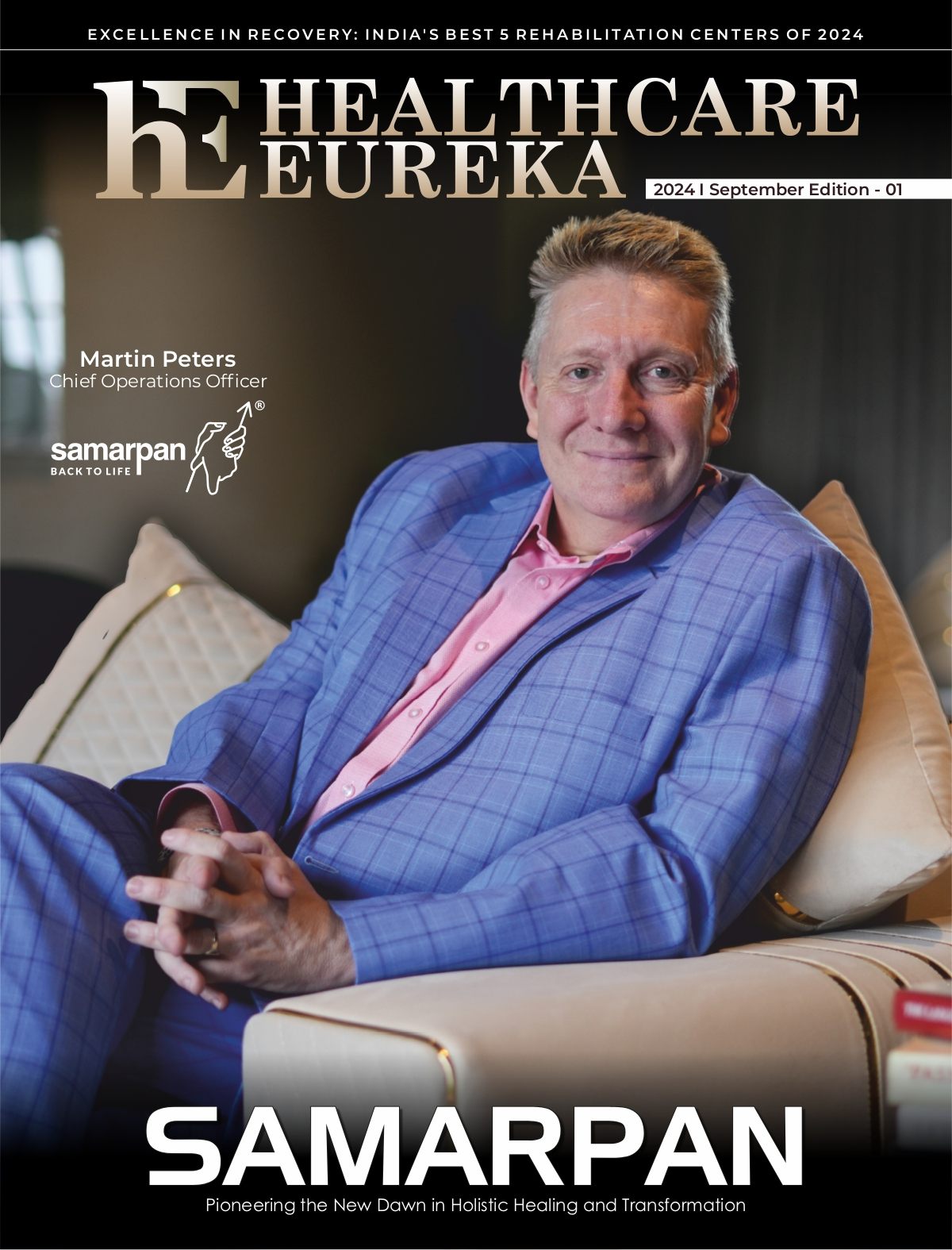Samarpan: Pioneering the New Dawn in Holistic Healing and Transformation

In an age where mental health and addiction treatment are reaching new frontiers, there’s a compelling shift towards a more nuanced and holistic approach to healing. Today’s treatment landscape is not merely about addressing symptoms but about transforming lives through a blend of innovation and empathy. As the world navigates this evolving terrain, there’s a heightened focus on merging advanced therapeutic techniques with a profound understanding of each individual’s unique journey.
In this realm, Samarpan is a name that stands out by integrating innovative therapeutic techniques. Samarpan is the brainchild of Mr. Shrenik Baldota and the Abheraj Baldota Foundation, driven by their vision to offer world-class mental health and addiction treatment in India. The organization began its journey in Mumbai, with Dr. Azhar Hakim playing a crucial role in its establishment in 2021. Martin Peters, an expert recruited in the same year, was tasked with setting up the residential services.
Martin Peters recognized a significant gap in the Substance Use Disorder field, noting the absence of rehabilitation programs that provided an international standard of treatment. He also identified the need for an enhanced outpatient service, which goes beyond traditional one-on-one counseling. Samarpan’s outpatient offerings now include a variety of support groups, Intensive Outpatient Programs, and comprehensive psychiatric and psychological assessments. Over the next three years, the organization aims to expand and refine both its Residential and Outpatient services, continuing its commitment to high-quality care.
Expanding Horizons in Global Mental Health Treatment
Samarpan has firmly established itself at an international standard, attracting approximately 30% of its clients from overseas, a figure that is expected to grow. The center has developed a distinctive program that sets it apart from traditional medicalized models prevalent in India.
It is currently the only GORSKI-CENAPS Accredited Centre of Clinical Excellence for Relapse Prevention in Asia, reflecting its commitment to maintaining international standards. The center boasts a highly skilled team, a state-of-the-art facility, and a robust treatment program under the leadership of Obi Unaka, Director of Residential Services.
Previously, Samarpan’s outpatient services focused primarily on individual counseling sessions. However, in recent months, the center has introduced Intensive Outpatient Programs for addiction, as well as support groups for families dealing with issues related to anxiety and depression.
Looking ahead, Samarpan plans to launch a range of niche groups and programs for mental health, including those addressing trauma, eating disorders, anxiety, and depression. This expansion represents a significant differentiator from other services and aligns with the goal of providing a comprehensive seven-day-a-week service in Mumbai within the next year. These developments further distinguish Samarpan as a leader in the field of mental health and addiction treatment.
Breaking Mental Health Barriers
In establishing a new organization, challenges are inevitable, particularly when introducing innovative treatment methods. When Martin Peters first joined Samarpan, he frequently encountered skepticism about the feasibility of implementing new concepts in India. Despite these initial doubts, he observed that nearly all the proposed methods have proven effective.
One significant challenge has been the recruitment of staff. Despite offering competitive salaries, professional development opportunities, clinical supervision, and clear career pathways, attracting qualified professionals has remained difficult. The addiction treatment field in India has a limited number of professionals with addiction-specific credentials, necessitating extensive training for the current team and the recruitment of overseas-trained professionals to fill the gap.
Additionally, Samarpan faces challenges related to the stigma surrounding addiction and mental health. Many clients struggle to differentiate between genuine therapists and individuals who might present themselves as professionals due to effective marketing, yet lack the necessary qualifications. High-quality therapy is costly, and Martin Peters emphasizes that while Samarpan may be perceived as expensive, this reflects the reality that highly skilled staff with extensive training and expertise do not come cheaply.
Multidisciplinary Team Approach to Comprehensive Care
Martin Peters has extensive experience working across mental health and addiction services in Asia and the UK, and he firmly believes in the effectiveness of a Multidisciplinary Team (MDT) approach. This method involves a collaborative strategy where professionals from various disciplines come together to provide comprehensive care for individuals facing mental health and addiction challenges. Key components of the MDT approach include:
- Holistic Care: The MDT addresses not only the symptoms of mental illness or addiction but also considers the individual's overall health, social circumstances, and environmental factors, ensuring a comprehensive approach to treatment.
- Collaboration: By bringing together experts from different fields, the MDT ensures that treatment plans are developed and executed with a diverse range of perspectives, coordinating all aspects of a patient's care effectively.
- Shared Goals: MDTs work collaboratively to set and pursue shared goals for patient outcomes. This promotes consistency in treatment and support, ensuring that all services and providers are aligned in their approach.
- Patient-Centered: The MDT approach often involves patients in the decision-making process, respecting their preferences and needs, and ensuring that treatment plans are tailored to their individual requirements.
- Integrated Services: By integrating various services, MDTs are able to address comorbid conditions more effectively, such as co-occurring mental health and substance use disorders, providing a more cohesive treatment experience.
Overall, the MDT approach enhances the quality of care, supports better patient outcomes, and fosters improved communication among different sectors of health and social services.
Dynamic Healing Networks
Samarpan currently offers evidence-based approaches to treatment through individual counseling using modalities such as Cognitive Behavioral Therapy (CBT), as well as robust psychiatric consultations and psychological assessments. It ensures that the best approach is used for each client, recognizing that there is no one-size-fits-all treatment.
Samarpan offers a variety of therapy groups, each catering to different needs and therapeutic goals. Among these, some groups emphasize interpersonal learning, where members explore and discuss their feelings in relation to one another. Other groups, known as support groups, are more focused on participants’ external life experiences outside the group setting. Additionally, there are psychoeducational groups led by clinicians who teach specific skills such as Dialectical Behavior Therapy (DBT) or Cognitive Behavioral Therapy (CBT) skills, communication techniques, anger management, and relapse prevention.
From their experience, Samarpan finds Interpersonal Process Group Therapy to be a particularly effective approach. This type of therapy allows clients to recognize they are not alone, helps them develop skills in both giving and receiving feedback and encourages them to express themselves and relate to others more effectively. Ultimately, group therapy at Samarpan provides clients with a supportive network, creating a safety net that fosters their growth and healing. Samarpan firmly believes that group therapy is an essential component of any comprehensive service provider.
A Robust Structure of Therapeutic Activities
At Samarpan, every aspect of the program is carefully designed as an intervention, from the schedule and code of conduct to the content and activities. With a combined experience of over 60 years in mental health and addiction services, both the founders, Samarpan and Obi, ensure that every element of the program is intentional and purposeful, never left to chance.
The program is deeply rooted in serving the community, featuring a robust structure of therapeutic activities. Each day includes four group therapy sessions in addition to individual counseling, yoga, meditation, art therapy, personal training, massage, and reiki. Additionally, clients participate in Family sessions, and there is a weekly Family support group in Mumbai for all family members.
Meals are shared collectively, with both clients and staff eating together, reinforcing the program’s commitment to creating a cohesive and supportive environment. Every detail of the program, from the activities to the daily routines, is meticulously crafted to serve as a meaningful intervention in clients’ journeys towards recovery.
In the program, Cognitive Behavioral Therapy (CBT) and Dialectical Behavior Therapy (DBT) are central approaches. After clients have spent some time in the rehab, the focus shifts from the substance itself to the individual and their internal experiences, including their thoughts, feelings, urges, actions, and reactions. Both DBT and CBT are highly effective in helping clients build more robust emotional and cognitive frameworks to manage life’s challenges.
The program emphasizes customizing these approaches to suit each client’s specific needs. Individual treatment planning, conducted after thorough assessments, is crucial. Additionally, consistently tracking clients’ progress ensures that they benefit from the therapy. The program’s continued care component and recovery planning are vital for supporting clients as they transition back into their everyday lives
An Ideal Hub of Recovery
Samarpan offers a remarkable environment, featuring high-quality facilities situated in a tranquil and private location. The therapists at Samarpan recognize that the treatment process can be challenging for clients, and therefore strive to provide a comfortable setting where clients can navigate their discomfort.
It is important to note that while the environment is designed to be supportive, Samarpan is not a holiday resort. Clients are expected to actively participate in their treatment and are held accountable for their engagement in the therapeutic process.
At Samarpan, food plays a crucial role in the rehabilitation process. Upon admission, each client is provided with a consultation with a dietitian, allowing for meals to be tailored to individual dietary needs. The facility caters to a wide range of dietary preferences, offering both Indian and continental cuisine, with options for both vegetarian and non-vegetarian diets.
Recognizing the importance of nutrition in recovery, Samarpan addresses the often poor nutritional habits of clients. By focusing on all aspects of a client’s needs, the program ensures that nutrition supports their overall recovery journey.
Envisioning Global Impact
Samarpan is committed to continually enhancing its services, both in residential and outpatient settings. The organization aims to establish a seven-day-a-week outpatient service in Mumbai, with plans to expand its offerings through the addition of new staff and services. Over the past three months, Samarpan has already introduced several new services, and these will be further developed and expanded.
In the next two to three years, Samarpan envisions broadening its rehabilitation services, including the rollout of specialized programs. The goal is to gain recognition as an international rehabilitation center, a status that has already been achieved to some extent in the professional field abroad, thanks to the high-quality services provided by Obi and the founder. The organization also aims to increase its visibility and impact across India, having only begun to explore a small part of the country. Samarpan plans significant expansion over the coming year and remains open to collaborations with other professionals in the field.
Latest Editions
-
 David Fiorucci: Transforming Leadership and Driving Sustainable Changemagazines
David Fiorucci: Transforming Leadership and Driving Sustainable Changemagazines -
 Visionaries of Global Healthcare 2025: Transforming Lives Through Innovation and Excellencemagazines
Visionaries of Global Healthcare 2025: Transforming Lives Through Innovation and Excellencemagazines -
 Excellence in Recovery: Best 5 Rehabilitation Centers of 2024magazines
Excellence in Recovery: Best 5 Rehabilitation Centers of 2024magazines -
 Middle East's Most Innovative Women in Healthcare Revamping the Future, 2024magazines
Middle East's Most Innovative Women in Healthcare Revamping the Future, 2024magazines -
 Transforming Health Horizons: Middle East's Dynamic Healthcare Leaders, 2024magazines
Transforming Health Horizons: Middle East's Dynamic Healthcare Leaders, 2024magazines
